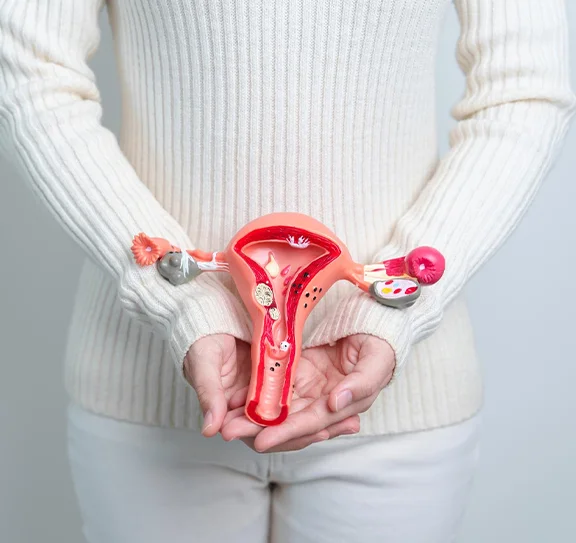

We believe in empowering women to make the best decisions related to their health by addressing health issues they often refrain from speaking about. Our Department of Gynaecology is staffed by a team of expert Gynaecologists who specialize in the diagnosis and treatment of a wide range of female health issues, including Fibroids.

Uterine Fibroids, often referred to as leiomyomas or myomas, are one of the most prominent Gynaecological problems affecting the Uterus.< /p>
These are multiple, tiny, non-malignant growths, on the inner or outer wall of the uterus, which are most commonly seen in premenopausal women, lying in the age group of 35 to 50 years.
As per the Office on Women’s Health, nearly 20 to 80 per cent of women develop the problem by the time they hit their 50s. Yet, a lot of women suffering from them don’t have any clue because these usually tend to be asymptomatic.
Fibroids are categorized into four categories based on their location in the Uterus.
Many women with fibroids have no symptoms, but when these develop, they can be severe and have an impact on their quality of life.
You should consider seeing our experts, at Surya Hospital, if you are experiencing any of the following:
Uterine Fibroids do not have a specific cause that can be pinpointed.
These are thought to emerge from an aberrant proliferation of smooth muscle cells in the uterus and have been linked with an abnormal increase in estrogen levels, which is quite common during pregnancy. Certain genetic factors may also play a role in this.
Risk factors that have been associated with increased incidence of fibroids include:
Despite being the most common types of tumours that develop within the uterus, uterine fibroids are benign and have nothing to do with uterine cancer.
Yes, it is important to seek expert medical intervention as these can give rise to unpleasant symptoms and complications like intermittent bleeding, severe pain, pelvic discomfort, spasms and constipation. Yet, it is important to seek expert medical intervention as these can give rise to unpleasant symptoms and complications like intermittent bleeding, severe pain, pelvic discomfort, spasms and constipation.
Although not all, some types of fibroids can make it difficult for you to conceive. The problem may be experienced by nearly 5 to 10 per cent of women with fibroids.
The size of the fibroids may be a determining factor as fertility issues are likely to affect women with fibroids that are larger than 6 cm in diameter.
The significant increase in estrogen and progesterone levels, which is common during pregnancy, can boost the growth of fibroids.
As far as the development of fibroids is concerned, pregnant women are less likely to develop these, with an incidence of only 0.1 to 3.9 per cent.
Our experts generally start by asking questions, evaluating your medical history and conducting a normal pelvic exam.
Based on the type and severity of the symptoms, if we suspect that you have Uterine Fibroids, further tests may be recommended to confirm the diagnosis and assess the size and location of the fibroids.
Common diagnostic modalities used by our team include:
All these facilities are available in our diagnostic unit, to ensure a hassle-free experience for you.
At Surya Hospital, our experts curate personalized treatments depending on the severity of the symptoms, the size and location of the fibroids, and whether or not you desire to have children in the future.
Common treatment strategies used by us include:
In the majority of cases, Fibroids don’t affect one’s Fertility and excessive Fibroids can be the sole cause of Infertility in just 2 to 3 per cent of Females. Fibroids have nothing to do with ovulation, however, some of these can make it hard to conceive or maintain a pregnancy. The best way to know is by consulting an expert and getting yourself evaluated.
It is very uncommon for a 15-year-old to have Fibroids, however, the possibility cannot be completely negated.
Uterine Fibroids are neither cancerous and nor increase the risks of developing the same.
No, it is not possible to prevent uterine Fibroids as they do not have a known cause that can be addressed. Resorting to an active lifestyle and watching your weight may help to bring down the risks to some extent.
No, not all women with Fibroids need Surgery and some of the cases can be effectively managed with medication. This depends on the severity of the fibroids and the symptoms associated with it.
It is good to be curious when it comes to your health, but, it is equally important to put your curiosity to rest by seeking expert opinion. Have more questions related to your health?
Meet the compassionate souls behind our services. Our dedicated team of professionals is here to ensure you receive the best care, always

Meet the compassionate souls behind our services. Our dedicated team of professionals is here to ensure you receive the best care, always
Our commitment to world-class care is reflected in our numerous certifications, awards, and partnerships. Trust in our proven track record of excellence.
